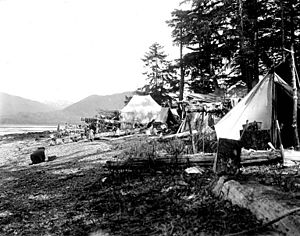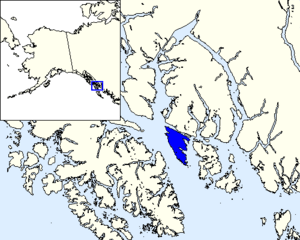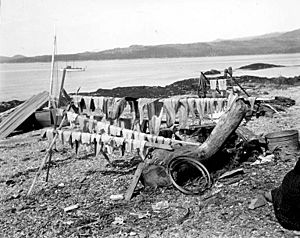Gravina Island facts for kids

Gravina Island is an island located in southeastern Alaska. It's part of a group of islands called the Gravina Islands, which are within the larger Alexander Archipelago. The island is about 21 miles (34 km) long and 9.5 miles (15 km) wide. Its total land area is around 94.81 square miles (245.6 km²). In 2000, about 50 people lived on Gravina Island.
Contents
Island's Name
The name "Gravina Islands" was first given by a Spanish explorer named Jacinto Caamaño in 1792. A year later, in 1793, George Vancouver used the name specifically for Gravina Island itself. The island was named to honor Federico Carlos Gravina y Nápoli. His family name came from the town of Gravina in Puglia, which is in Italy.
Getting There
Ketchikan International Airport is located right on Gravina Island. This airport is very close to the city of Ketchikan, which is on another island. They are separated by a narrow water channel called the Tongass Narrows, which is about half a mile wide. To get from Ketchikan to the airport on Gravina Island, people use a ferry service. The ferry ride is quick, usually taking only three to seven minutes. It runs very often, at least every half-hour.
Island Life and Events
Gravina Island is a quiet place. In 2016, a fire broke out in a home on the island. A special fireboat called the Harry Newell quickly responded. Firefighters worked hard to stop the fire from spreading to other areas. Even though they couldn't save the building, they kept the fire from causing more damage.
Population Over Time
Gravina Island was first counted as a separate community in the U.S. Census in 1940. At that time, 56 people lived there. This was the only time it appeared as its own community in the census records.
Wildlife and Plants
Gravina Island is home to many different kinds of plants and animals. One interesting animal found here is a type of newt called the Crater Lake Newt. This newt is a subspecies of the Rough-skinned newt. Gravina Island is one of the northernmost places where this newt lives in Alaska.
The "Bridge to Nowhere" Idea
In 2002, there was a plan to build a prison on Gravina Island. To connect the island to Ketchikan, a bridge was suggested. The federal government was supposed to provide a lot of money for this bridge. They also planned to spend money to bring electricity to the island. However, the local government in Ketchikan did not approve the prison idea. The governor of Alaska also disagreed with the plan.
Even though the prison idea didn't happen, the idea of building a bridge to Gravina Island continued. In 2005, a bill in Congress set aside a large amount of money, $223 million, to build the Gravina Island Bridge. This bridge was meant to replace the ferry service that connects Ketchikan to its airport on Gravina Island.
Many people called this proposed bridge "The Bridge to Nowhere." They felt it was a waste of money because the island had very few residents. Eventually, the federal money set aside for the bridge was taken back. However, Alaska still received a lot of money for transportation projects. The state continued to look for ways to improve access to the airport, which could include making the ferry service better. Even after the bridge plan was dropped, some money was spent on building a road on Gravina Island that was originally meant for the bridge, but it didn't lead anywhere useful.
 | Leon Lynch |
 | Milton P. Webster |
 | Ferdinand Smith |



